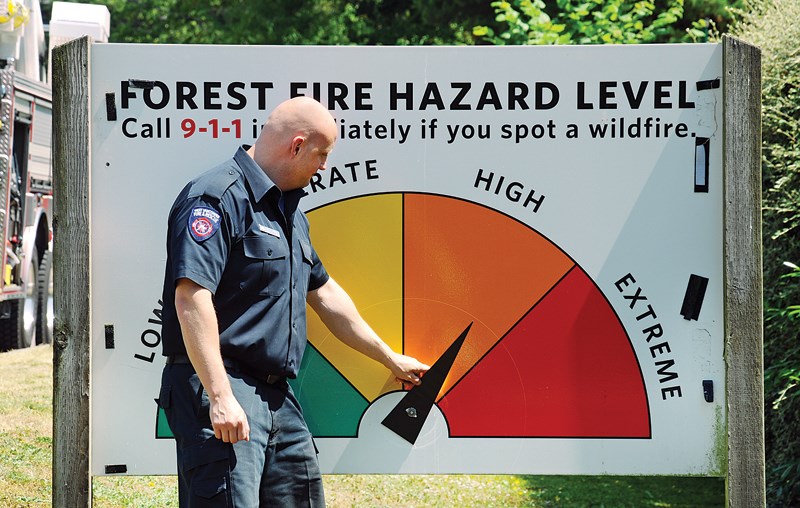North Shore emergency crews and municipalities are encouraging residents to stay vigilant when it comes to fire safety this summer in the wake of aggressive wildfires that have affected much of the B.C. Interior.
A provincial state of emergency was declared Friday as wildfires – now numbering more than 200 – raged across B.C., primarily in the Cariboo region.
So far, more than 14,000 people have been evacuated provincewide and many are now grappling with the loss of their homes and properties.
“Currently, we have signs posting that it’s a high fire rating through the municipality,” said West Vancouver District assistant fire Chief Jeff Bush. “We’re urging residents to be careful when discarding their smoking material. And we’ve also urged residents if they do see smoke or fire coming from the woodland areas to call 911 and report it immediately.”
Bush said that since May 1 there had been 12 small wildfires in West Vancouver, the majority of which were caused by people not properly discarding their smoking materials, such as cigarettes.
Mairi Welman, community relations manager with the District of North Vancouver, said it was important for people to act fire-aware, but the district wasn’t hitting the panic button yet.
“I don’t think anyone needs to be worried just yet on the North Shore, but we do need to keep our eyes open and we do need to act responsibly,” Welman said. “Right now this year we’re just in the ‘remain vigilant’ phase.”
According to Bush and Welman, the North Shore’s forests, mountains and relative inaccessibility in some neighbourhoods makes wildfire-vigilance a requirement.
“We’ve got a lot of areas that are very inaccessible and that’s what they’re dealing with up in the Interior,” Welman said. “The fire in Harrison Lake – part of the problem with that was that it was so inaccessible.”
Bush added that the District of West Vancouver’s perspective is that any forested area is a potential risk area.
“The whole municipality is a risk area because there’s so much wooded area. We’re trying to really hit with an educational campaign to encourage residents to be very, very observant and be very responsible with discarding your smoking material,” he said.
On Monday, the B.C. government banned all open fires, including campfires, across the province.
According to a release, the ban was implemented to prevent human-caused wildfires and protect public safety.
While North Shore municipalities are recommending caution, more drastic measures could be taken if a high fire rating or extreme heat persists.
“Lighthouse Park is, of course, the jewel of our municipality, so that’s one thing: we may look at closing the park at some point in time,” Bush said.
But he admitted that park closures were unlikely, partly because allowing people to access parks – and therefore report wildfires they may encounter – is important for the community.
“I would lean towards not closing the park because if we close the park we lose our eyes and ears,” he said.
Lori Daniels, a UBC associate professor of forest ecology and North Vancouver resident, said that unlike in the B.C. Interior, lightning doesn’t contribute to Lower Mainland or North Shore wildfires to the same extent.
“Given the millions of people that live in the Lower Mainland, it’s really human ignitions that are our biggest risks in our parks and then in the forests surrounding us,” Daniels said.
In the short term, Daniels recommended North Shore residents work on fire-proofing their properties.
“People could be making sure there’s no debris up on the roof and eavestroughing, because if there are needles or leaves or branches from trees and other vegetation like that, that’s burnable material and if a spark landed on that material, it puts your house at risk,” she said.
Residents are encouraged to visit the North Shore Emergency Management and BC Wildfire Service websites for up-to-date fire safety and wildfire information.
The Canadian Red Cross is supporting the Government of B.C. in providing relief in areas affected by wildfire. Donate to the British Columbia Fires Appeal.



